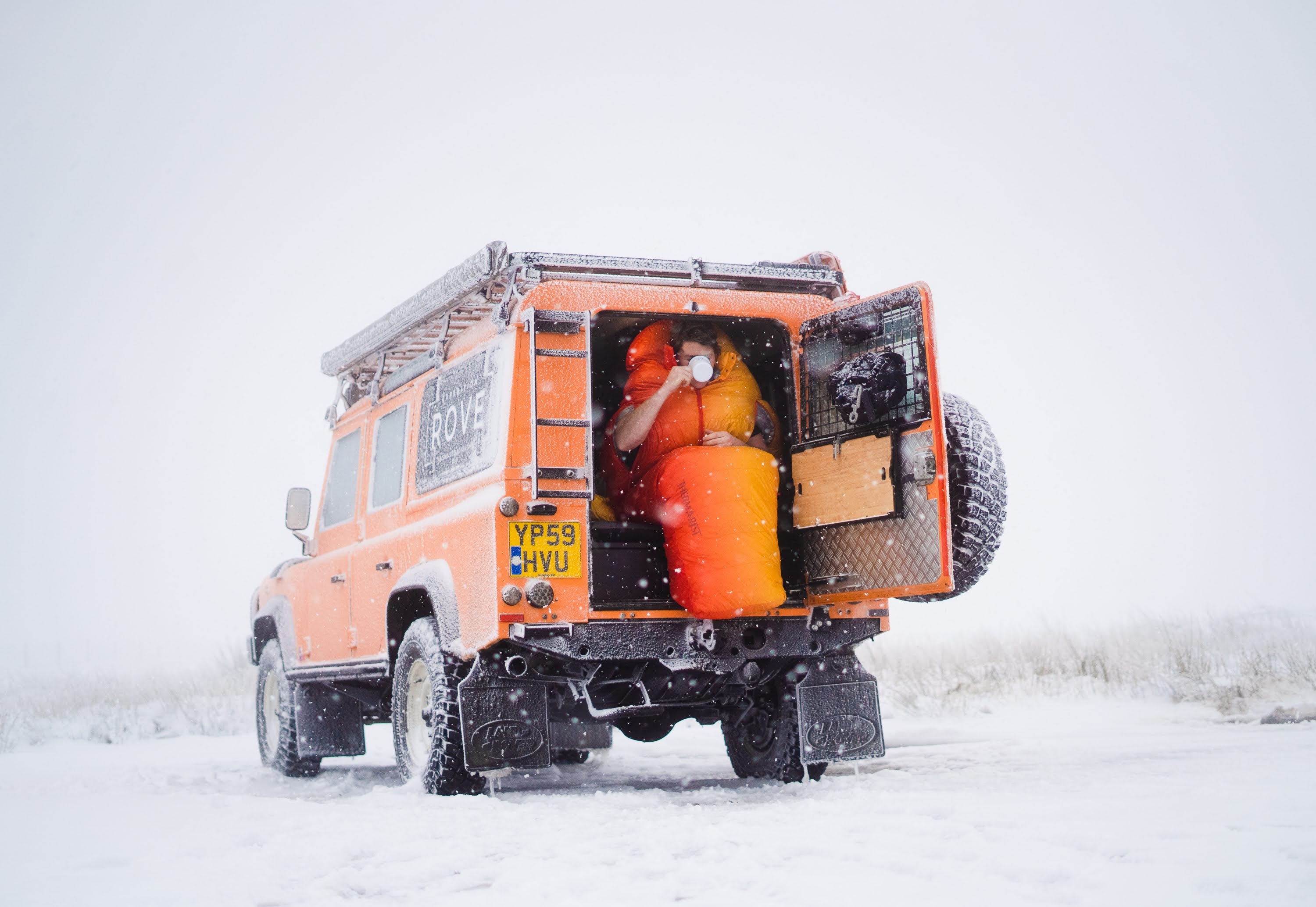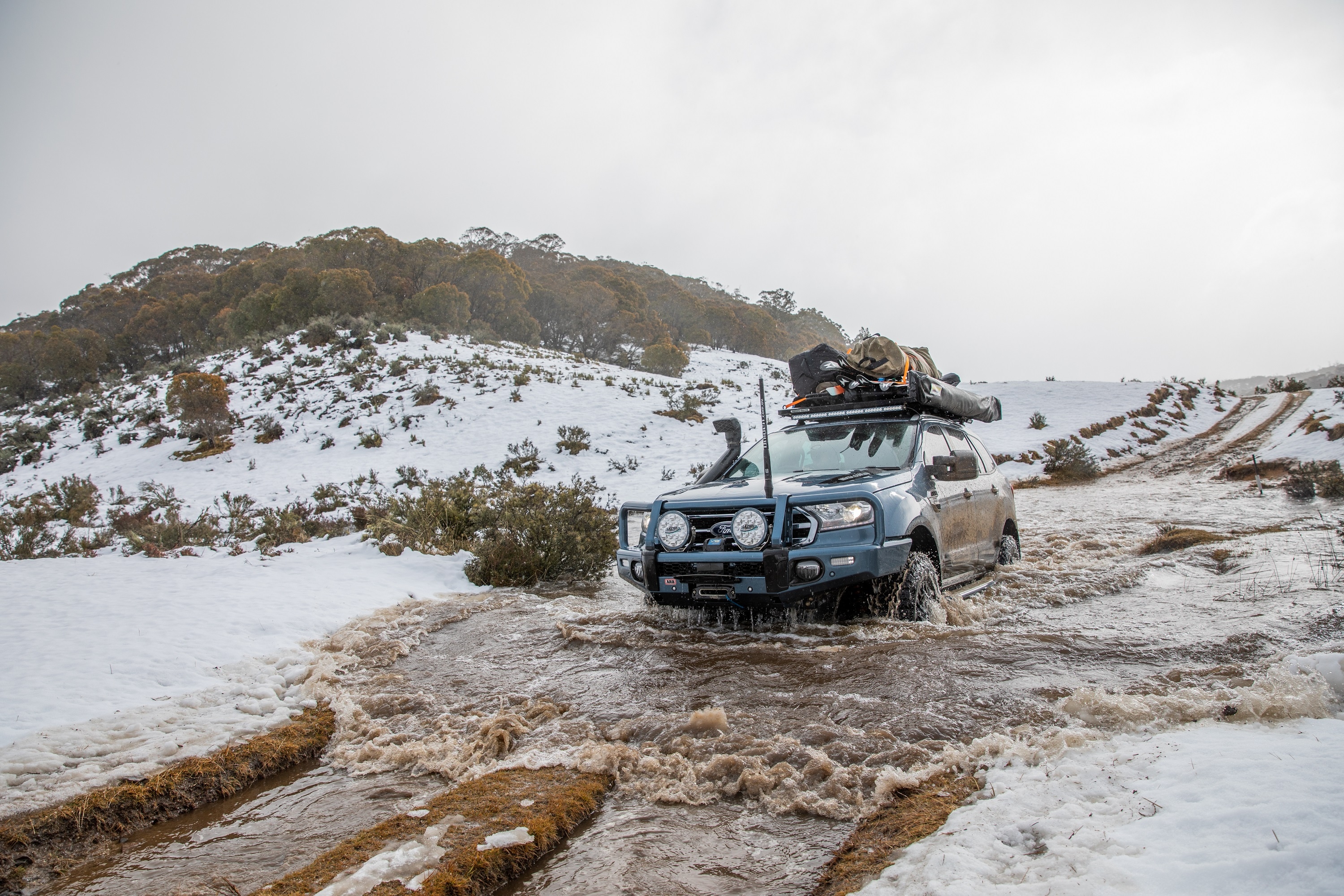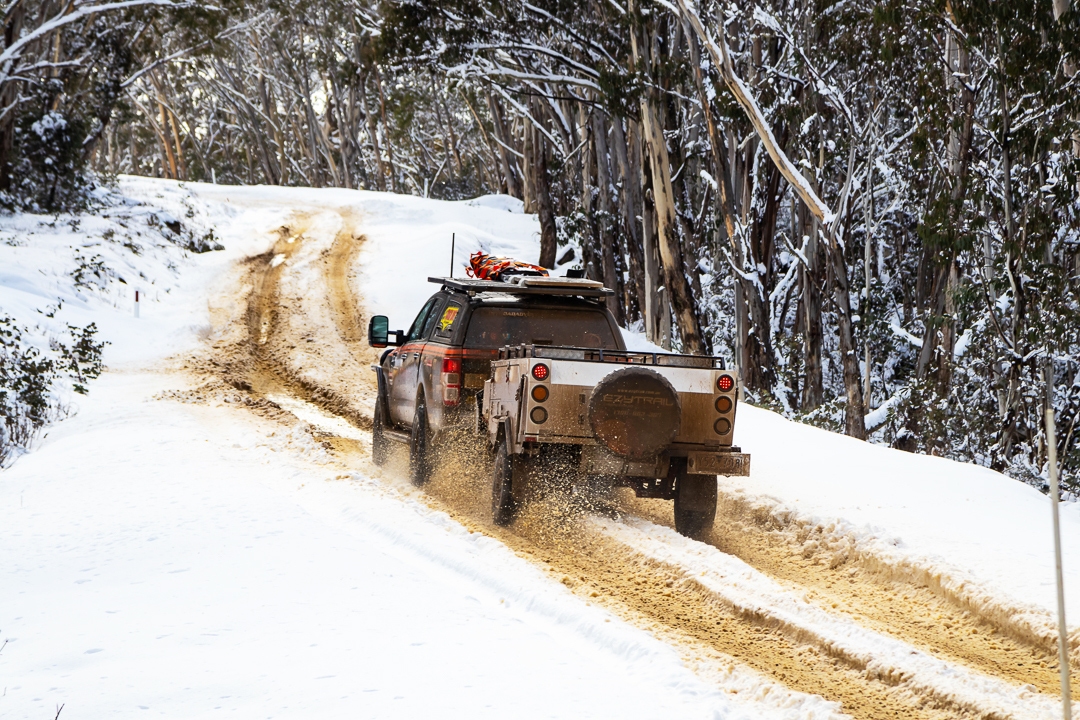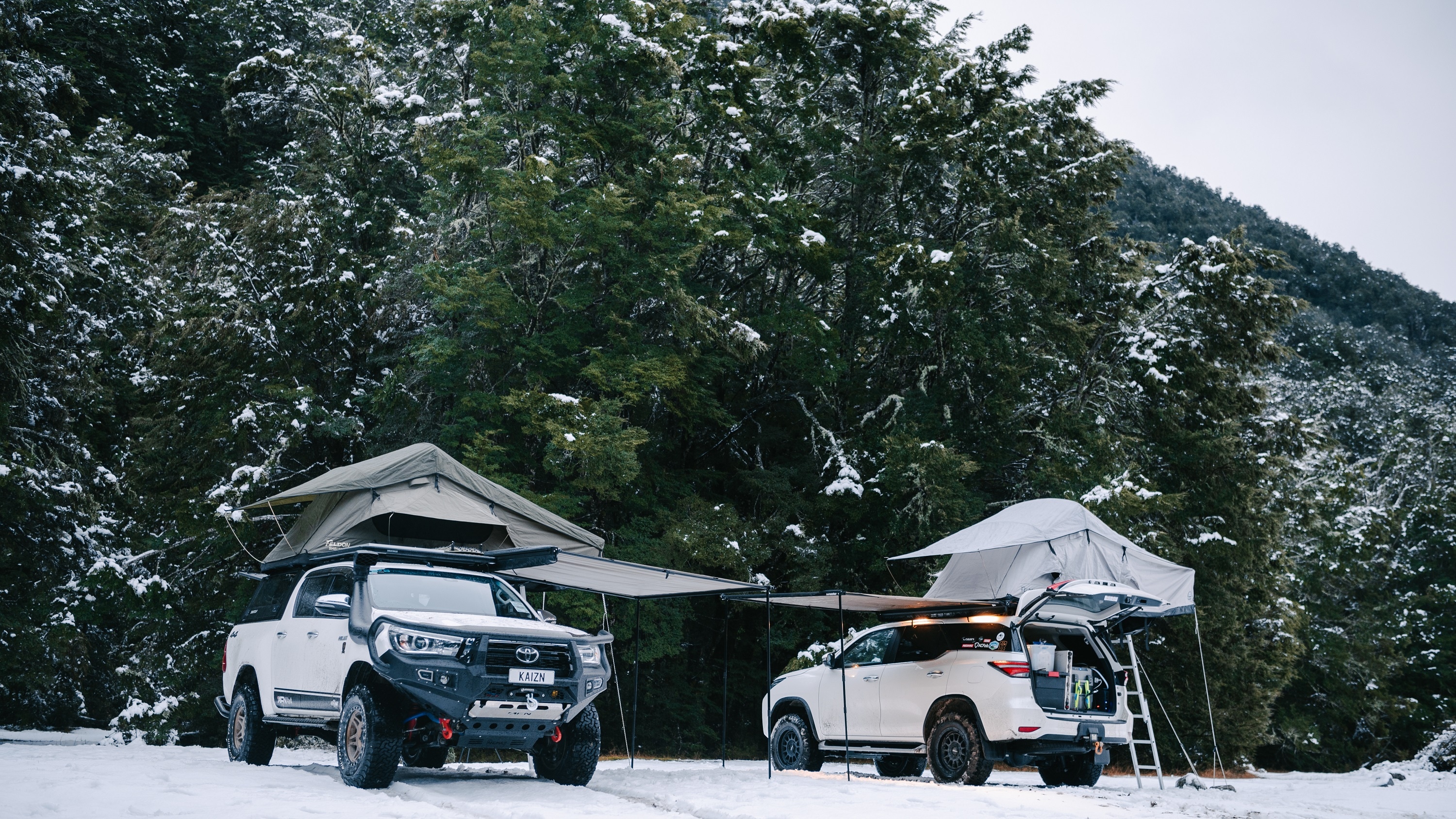The great thing about camping is that it is enjoyable in any season. Each season brings something unique to the experience – whether that be the new plant life, increase in river flow and warmer sunshine during spring; the inviting beach and warm nights of summer; or the beginning of campfire season and the idea of roasting marshmallows in autumn.
And it’s no different when winter arrives – it could be the snow, it could be lush bushland, it could be the idea of getting cosy in a tent, swag or caravan. Winter camping appeals to many camping enthusiasts.
So here are a few tips from our travelling community to help you plan your next winter camping trip.


CLOTHING
Sounds basic right? Avoid freezing toes and fingers by choosing the right gear for your camping trip. The goal is to protect yourself against the elements as much as possible - wind, rain and cooler temperatures.
Thermal
Wear thermal undergarments, have an insulated and/or waterproof jacket on hand; a beanie and decent socks will help your body retain heat and a pair of gloves will help you along just nicely.
A sure-fire way to dampen your weekend is with wet shoes, so choose boots that are designed to handle the elements. If you are planning to go camping in the snow, then of course you need to be fully geared up for that experience, so read these tips for snow camping.
Keep your gear warm
'Shove your clothes for the next day into the bottom of your sleeping bag. In the morning, getting changed into warm clothes makes your morning just a little easier' - Shenaid, Camper Austalis.
Winter can shine
Aside from all the protective gear, it’s a good idea to take clothing suitable for some of the sunny winter days. These can be surprisingly warm and still pack a punch as the UV rays still have the capacity to burn your skin. We suggest you take a wide brim or light weight hat and a light-weight jacket or warm jumper for days like those – as well as some sunscreen.
Spare clothes
Always take spare clothes in case the winter rain drenches you or a slip in the mud ruins your day. Children are experts at locating mud and puddles and even better at ensuring their clothes are covered in it.
Kirby and Gibbo from One Day We Should travel with their three children. They say the most fun is to let your kids ‘chuck on a raincoat and play in the rain,’ if it’s not too cold. Their tips to aviod cabin-fever during rainy weather, include taking the kids on excursions to indoor playcentres, libraries, aquatic centres, shopping centres and even a trip to Bunnings.


SLEEPING
Bedding
You want to avoid sleeping on a cold floor during winter. The best way to avoid this is by selecting a mattress that can insulate you against the cold or grab an off-ground bed. Cold air can quickly become a problem particularly with blow-up mattresses, so cover the top with a nice blanket. Even better, place a piece of compressed foam underneath the mattress as this offer insulation between the floor and the mattress. Most swags account for this and are made to suit these kinds of conditions.
Sleeping bag or double it
Choose a sleeping bag that’s right for this season. Sleeping bags have different grades of insulation and usually come with an indication of which season or temperature the sleeping bag is rated for. You could choose one with a hoodie to keep your head warmer at night. Taking extra blankets with you may possibly be the next best decision you make.
Creature comforts
If you’ve planned ahead and got a pure sine wave inverter and dual battery charger as a means to boil hot water, then taking a hot water bottle with you will bring you cosy comfort when tucking in for the night. Most hot water bottles can last the whole night but beware the ones that turn cold overnight. If you have access to power through a battery management system or you happen to be at a powered site, then an electric hot water bottle is the best – being a gel pack they retain heat all night!
'Hot water bottles in sleeping bags takes the edge off the freezing bedding and helps you adjust.' - Shenaid, Camper Austalis.
If you have access to power, travelling duo Trepic can certainly testify to what worked for them when travelling just outside Antarctica.
They say, ‘It’s easier to stay warm than get warm,’ and go as far as using electric blankets!
‘We recently spent 2 months driving through Patagonia to the southern-most point in the world (outside Antarctica). The temperatures ranged from -6C to about 15C with constant 80km/hr+ winds’.
‘We don’t like sleeping bags, they make us both claustrophobic, so we decided to get ourselves an electric blanket and it was the best thing we did. It used a quite a bit of power to warm up (around 30amps) but after it warmed up it would drop back down to around 2 amps. It made all the difference getting into a hot bed. Mostly we didn’t even need it on once in bed as our body heat kept the bed warm. But on the cold nights we kept it on the lowest setting and slept like babies’ - Brett and Solene from Trepic
TIPS FOR YOUR CAMP SET UP
Campfires
A common tip from our travelling community was to find a place to build a campfire!
Campfire rules
‘Choose a camp spot where you can have a fire. Having a campfire is essential in winter! It can completely change a camping trip. Some places around Australia, including many of the national parks and state forests have complete bans on having fires at any time of the year. Make sure you check on the rules of where you’re going before you set off to avoid a cold night!’ – Emma, Explore Shaw Australia.
Chainsaw
‘When it comes to camping in the winter, nothing is more important than having a chainsaw with us. We love winter camping for the undeniable convenience of having a campfire. Being well stocked for the evening is made super easy when you can chop through bigger logs and having it ready to chuck on the fire’. – Tim and Jes from Wayside Wanders.


Shelter
Of course, all the effort you place into ensuring you have the right gear to sleep in and the right clothes to wear, works best when you have a suitable tent or caravan that can also handle the winter season.
Dome tents will allow the rain to run off easier, also make sure you choose a tent that is waterproof. A caravan may offer more protection against wind and rain with the advantage of being off-ground and avoiding the rain-soaked earth, also achieved by camping on the roof of your car!
Gazebos and awnings
‘Always take a gazebo camping in winter. Gazebos can be an absolute life saver when you are camping during winter. If the sun is out, they can provide you with some shade, and in the case of an unexpected shower they offer you a little sanctuary where you can stay dry’.
‘If you’re camping in a swag or small tent, set it up underneath your gazebo for a completely dry camp site. Having some dry space to walk around when you wake up in the morning will feel like a luxury campsite!’ – Emma, Explore Shaw Australia


PREPARATION
The Todoing Family are caravanning around Australia. They share how they manage to use solar in winter and offer great advice about knowing the changes in road conditions that winter can bring.
'Our best tip for winter is to make sure you keep your solar panels clean, as well as taking extra time to have a think about how you set up your campsite. Pay extra attention to shade, the suns location and then movement throughout the day.


Winter often means less sun, more clouds and that can make it hard when trying to spend time at some of those awesome free or low-cost camping locations.
Winter means that the conditions out there are changing perhaps more rapidly than through the drier months. Rain will come and go, you may encounter more pot holes, icy roads or washouts in some of the great driving tracks. Be aware that how you drive in the drier months must change in the wetter or lower visibility months. Reaction times will change, and the ability to pull up or manoeuvre around obstacles will be different. Drive to the conditions and always think and look ahead.' – Justin and Stephanie, Todoing Family.
Some great advice from experienced travellers. With the message very clear; prepare, stay warm, stay dry and enjoy your winter camping trip.
